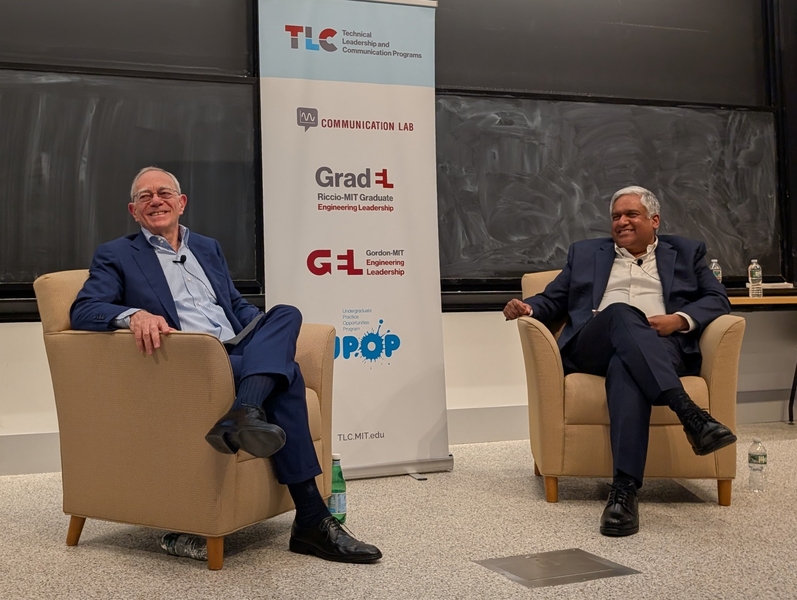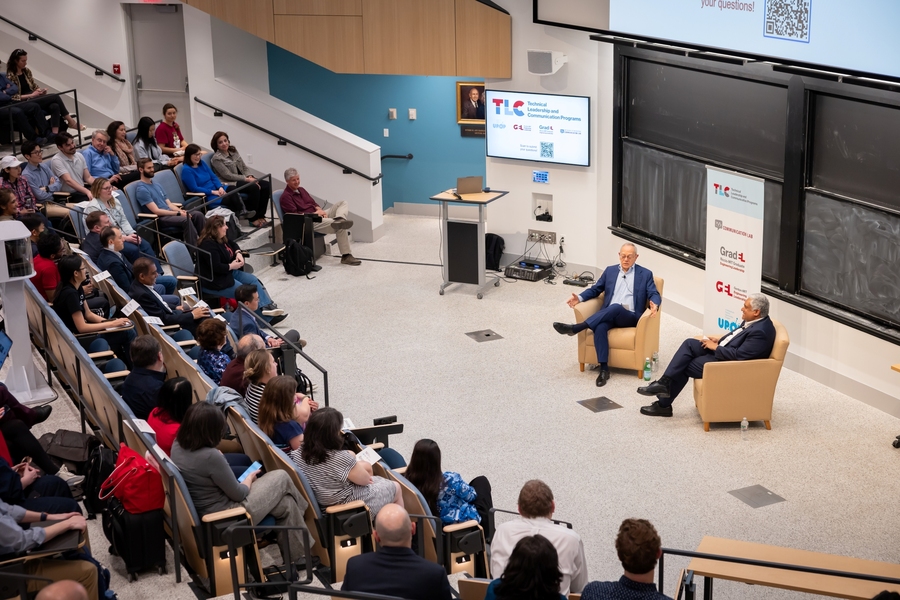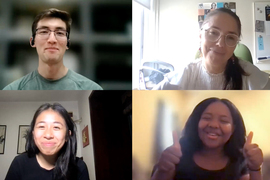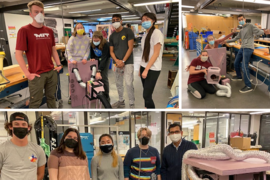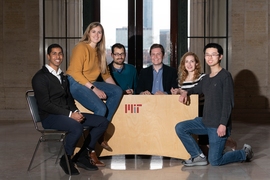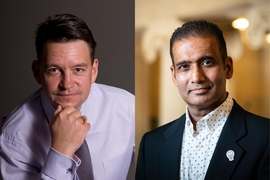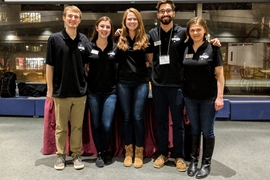As an electrical engineering student at Stanford University in the late 1970s, L. Rafael Reif was working on not only his PhD but also learning a new language.
“I didn’t speak English. And I saw that it was easy to ignore somebody who doesn’t speak English well,” Reif recalled. To him, that meant speaking with conviction.
“If you have tremendous technical skills, but you cannot communicate, if you cannot persuade others to embrace that, it’s not going to go anywhere. Without the combination, you cannot persuade the powers-that-be to embrace whatever ideas you have.”
Now MIT president emeritus, Reif recently joined Anantha P. Chandrakasan, chief innovation and strategy officer and dean of the School of Engineering (SoE), for a fireside chat. Their focus: the importance of developing engineering leadership skills — such as persuasive communication — to solve the world’s most challenging problems.
SoE’s Technical Leadership and Communication Programs (TLC) sponsored the chat. TLC teaches engineering leadership, teamwork, and technical communication skills to students, from undergrads to postdocs, through its four programs: Undergraduate Practice Opportunities Program (UPOP), Gordon-MIT Engineering Leadership Program (GEL), Communication Lab (Comm Lab), and Riccio-MIT Graduate Engineering Leadership Program (GradEL).
About 175 students, faculty, and guests attended the fireside chat. Relaxed, engaging, and humorous — Reif shared anecdotes and insights about technical leadership from his decades in leadership roles at MIT.
Reif had a transformational impact on MIT. Beginning as an assistant professor of electrical engineering in 1980, he rose to head of the Department of Electrical Engineering and Computer Science (EECS), then served as provost from 2005 to 2012 and MIT president from 2012 to 2022.
He was instrumental in creating the MIT Schwarzman College of Computing in 2018, as well as establishing and growing MITx online open learning and MIT Microsystems Technology Laboratories.
With an ability to peer over the horizon and anticipate what’s coming, Reif used an array of leadership skills to develop and implement clear visions for those programs.
“One of the things that I learned from you is that as a leader, you have to envision the future and make bets,” said Chandrakasan. “And you don’t just wait around for that. You have to drive it.”
Turning new ideas into reality often meant overcoming resistance. When Reif first proposed the College of Computing to some fellow MIT leaders, “they looked at me and they said, no way. This is too hard. It’s not going to happen. It’s going to take too much money. It’s too complicated. OK, then starts the argument.”
Reif seems to have relished “the argument,” or art of persuasion, during his time at MIT. Though hearing different perspectives never hurt.
“All of us have blind spots. I always try to hear all points of view. Obviously, you can’t integrate all of it. You might say, ‘Anantha, I heard you, but I disagree with you because of this.’ So, you make the call knowing all the options. That is something non-technical that I used in my career.”
On the technical side, Reif’s background as an electrical engineer shaped his approach to leadership.
“What’s beautiful about a technical education is that you understand that you can solve anything if you start with first principles. There are first principles in just about anything that you do. If you start with those, you can solve any problem.”
Also, applying systems-level thinking is critical — understanding that organizations are really systems with interconnected parts.
“That was really useful to me. Some of you in the audience have studied this. In a system, when you start tinkering with something over here, something over there will be affected. And you have to understand that. At a place like MIT, that’s all the time!”
Reif was asked: If he were assembling a dream team to tackle the world’s biggest challenges, what skills or capabilities would he want them to have?
“I think we need people who can see things from different directions. I think we need people who are experts in different disciplines. And I think we need people who are experts in different cultures. Because to solve the big problems of the planet, we need to understand how different cultures address different things.”
Reif’s upbringing in Venezuela strongly influenced his leadership approach, particularly when it comes to empathy, a key trait he values.
“My parents were immigrants. They didn’t have an education, and they had to do whatever they could to support the family. And I remember as a little kid seeing how people humiliated them because they were doing menial jobs. And I remember how painful it was to me. It is part of my fabric to respect every individual, to notice them. I have a tremendous respect for every individual, and for the ability of every individual that didn’t have the same opportunity that all of us here have to be somebody.”
Reif’s advice to students who will be the next generation of engineering leaders is to keep learning because the challenges ahead are multidisciplinary. He also reminded them that they are the future.
“What are our assets? The people in this room. When it comes to the ecosystem of innovation in America, what we work on is to create new roadmaps, expand the roadmaps, create new industries. Without that, we have nothing. Companies do a great job of taking what you come up with and making wonderful things with it. But the ideas, whether it’s AI, whether it’s deep learning, it comes from places like this.”
